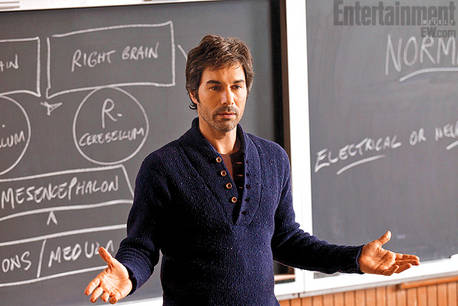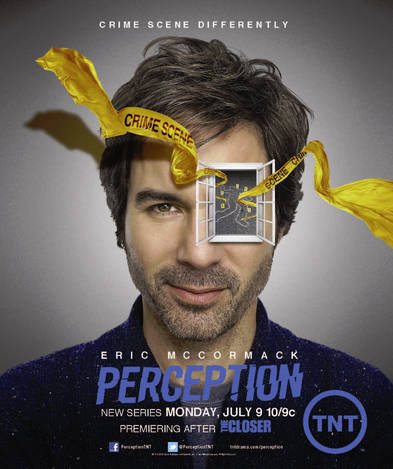Perception’s Daniel Pierce (Eric McCormack) is a brilliant neuropsychiatrist:
- He has published 7 books on neuroscience.
- He is teaching at a prestigious university while helping the FBI solve their most complicated cases.
- He has finished med school at the top of his class.
- He can see things and make connections others can’t.
- Only the most complicated and exciting puzzles can keep his interest.
- Oh, and, he is managing all this (depending on your perception), despite/with/because of his condition: schizophrenic paranoia.
He mostly manages his condition with carefully set routines, the help of his TA and living aid Max, and through the cases his FBI agent friend/ex-student Kate (Rachael Leigh Cook) brings.
Perception (aff.link) is a wonderfully inspiring show, especially if you are a writer and/or you’re suffering from a health condition, mental or otherwise.
It has great acting, intriguing storylines, a well-written main character and scientific accuracy, being assisted by the leading neuroscientist David Eagleman who’s also a writer (of fiction and non-fiction, his non-fiction having been published on Wired, The New Yorker and others.)
I like breaking the don’t-watch-tv productivity tip. I don’t watch everything, trust me. I try, evaluate and become a regular watcher of shows that are smart, highly entertaining, inspiring and intriguing. It helps if there are characters you can empathize with on one level or the other, or characters whose jobs you wouldn’t mind doing (e.g. Cal Lightman’s job, Lie to Me.)
Perception is such a show, and I recommend writers to at least check it out because:
1) Perception combines drama/mystery & comic relief really well. As writers, we want to be able to pull this off well, especially in fiction.
2) The leading character’s self-depreciating sense of humor as a defense mechanism works on a writing level, but it also gives us ideas on how to manage our own conditions and issues.
3) He writes to keep sane, and well, he is full of ideas all the time so he needs different media to convey them. He lectures, aids FBI and writes books.
4) He is a writing success despite his condition.
5) The show presents the very exciting field of neuroscience. I’ve been reading about it since I started watching the show.
6) There is a fictional role model, as well as a real one (the consulting neuroscientist/writer David Eagleman who was born in 1971!)

7) It gives you nice little flashback into university years. I only had a couple of inspiring lecturers, so I wouldn’t have minded one like Pierce: always engaging, always relevant.
If you are collecting reasons to go back to college, this might warm you up further to the idea. Just remember, not all campuses are that nice and a lot of the lecturers tend to be boring.
8) It’s possible to be a writing expert and expert writer at the same time. Writers might lack the professional knowledge and need to interview experts. Experts might lack the writing skills.
Pierce (and Eagleman) possess both. Oh, I should add that Eagleman brainstorms with Perception writers about the possible scenarios too.
9) It provides therapeutic entertainment. Just listen to the lectures where he covers lying, fears, reality…
10) And the series has an overall appreciation of individuality and life.
Have you watched it?
P.S. To read more about perception, you can check out its review here.
